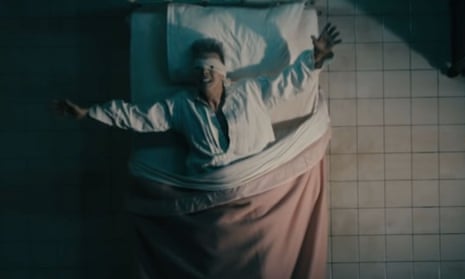David Bowie only discovered his cancer was terminal three months before he died, according to a documentary marking the anniversary of the superstar’s death.
The film, David Bowie: The Last Five Years – due to air on BBC2 on Saturday night, a day before what would have been the singer’s 70th birthday – reveals that Bowie discovered his treatment was to be stopped while he was filming the music video for his final single, Lazarus.
Bowie died on 10 January 2016, days after turning 69 and the release of his 25th studio album, Blackstar, having kept his illness a secret from the world.
“David said: ‘I just want to make it a simple performance video’,” said Johan Renck who directed the video, which features Bowie singing lines such as “Look up here, I’m in heaven” from a hospital bed.
He insists the common interpretation of the video – that the singer was hinting that he was on his deathbed – is wrong, because he came up with the concept a week before Bowie received his final diagnosis.
“I immediately said ‘the song is called Lazarus, you should be in the bed’,” says Renck. “To me it had to do with the biblical aspect of it ... it had nothing to do with him being ill.
“I found out later that, the week we were shooting, it was when he was told it was over, they were ending treatments and that his illness had won,” said Renck.
Yet even then, Bowie had not given up hope of surviving his cancer and was still keen to make new work just weeks before he died, according to Ivo Van Hove, who directed Bowie’s musical, Lazarus. In the programme he recalls one of the last exchanges the pair had, after the play made its debut in New York in 2015.

Describing how they sat chatting backstage, despite Bowie being noticeably weakened by his illness, Van Hove said: “He got through the night. I really am convinced that he was fighting death and he wanted to continue and continue. Afterwards we were sitting behind stage and he said ‘let’s start a second one now, the sequel to Lazarus’.”
The new documentary is the work of Francis Whately, and continues a narrative from his previous Bowie documentary for the BBC, David Bowie: Five Years, which was first broadcast in 2013 and focused on five of the singer’s most significant years between 1971 and 1983.
As part of a series of programmes this month, BBC4 will broadcast rarely seen Bowie performances from its archive, Martin Kemp will present a show dedicated to Bowie’s Life on Mars, and 6Music will host a “listening party” for the public’s favourite Bowie album, and a tribute show.
The latest Whately documentary looks in depth at the making of Bowie’s surprise 2013 album, The Next Day, his 2016 jazz-infused album Blackstar, which was released days before he died, and his first stage musical, Lazarus.
“This period hadn’t been explored by anybody so it was very interesting territory,” Whately told the Guardian. “In some ways he seems to have worked harder in that period than at almost any other time, except the beginning of the 1970s when he was producing Ziggy Stardust, Hunky Dory and Aladdin Sane.”
Bowie’s death came as a shock to the world. He had only shared news of his illness with those closest to him, and those collaborators who needed to know for professional reasons, such as Lazarus producer Robert Fox and his long-time friend and collaborator Tony Visconti, who both also appear in the documentary.
Whately emphasised how much energy Bowie had thrown into his final three projects, particularly Blackstar and Lazarus, right up until his death.
“Often he would go and record in the studio and then go and watch the rehearsals for Lazarus in the evening, or talk about the play in the morning, go to the studio, and then come back. It was quite an extraordinary workload,” said Whately.
“I think everyone would like me to say he was turning up to the studio to record Blackstar and he was terribly ill, but I don’t think he was. There are musicians in the Blackstar band who didn’t even know. We all now know he was ill, we know he was undergoing treatment, but it doesn’t seem to have had an effect at all on his output.”
Was he a man who took on these multiple projects because he sensed his time was running out? “We just don’t know,” said Whately.
The documentary also explores Bowie’s increasingly uncomfortable relationship with fame, which he had embraced at the beginning of his career as a means to gain creative freedom, but in later years he came to loathe.
After a heart attack in 2003, he took himself almost entirely out of the public eye. Whately says Bowie would have liked to have moved back to London, but stayed in New York for the relative anonymity it allowed him.
“I don’t find it strange he kept his illness so private,” said Whately. “He’d had his life picked over for 40 years and he thought he had said everything he wanted to say, there was nothing more.”
Whately describes as “simplistic” the narrative adopted by the media after Bowie died, that Blackstar was the singer’s deliberate parting gift to fans.
“I still don’t know if he started making Blackstar before he knew he was ill, or after,” he said. “People are so desperate for Blackstar to be this parting gift that Bowie made for the world when he knew he was dying but I think it’s simplistic to think that. There is more ambiguity there than people want to acknowledge. I don’t think he knew he was going to die.
“However, he must have known there was a chance he wasn’t going to recover, so, to do an album with a certain amount of ambiguity in it, is Bowie playing the cat and mouse game that he always played.”
Whately and Bowie had known each other for almost two decades, having worked together on a short film at the beginning of Whately’s career, and the pair regularly kept in touch over email. It was an exchange mainly of book and film recommendations, everything from Pulitzer-prize winning novel The Brief Wondrous Life of Oscar Wao by Junot Diaz to the 1973 BBC documentary series The Ascent of Man. Whately said Bowie would consume a book a day.
“I remember him once emailing me about American female soccer,” said Whately. “Who would have thought that David Bowie was a female soccer fan? It’s just not what you expect but it speaks to the man, that there was clearly nothing he wasn’t willing to learn about.”
He added: “The David Bowie that I knew in my limited way was incredibly courteous, was incredibly polite, well informed, utterly charming. But I would question anyone who said they really knew him. I don’t think anyone knew him.”
Out of respect for the privacy that Bowie valued so highly, Whately did not interview any of his family members and the film focuses on his musical, not his personal, life. However, he said he hoped that he had captured Bowie’s warm personality, and the particular pride the singer had in realising a lifelong dream to stage a musical in New York.
Michael C Hall, who played the lead role in the play, said Bowie’s satisfaction had been evident. “The last thing I remember David saying to me, after the hugs and the smiles after that opening night performance, was: ‘I think it went well tonight, don’t you?’”
